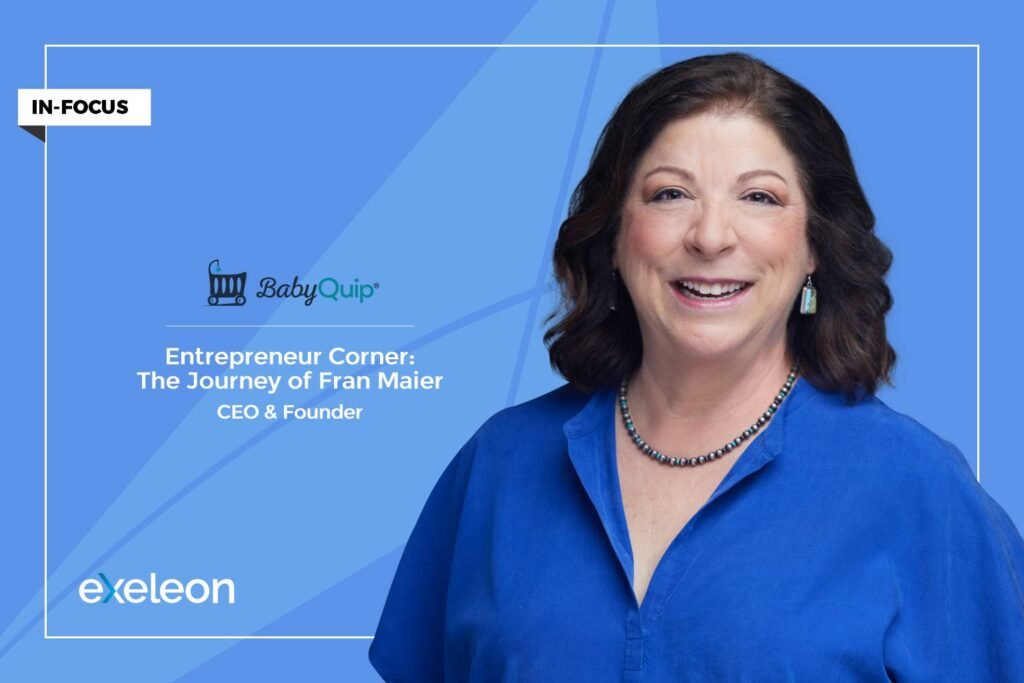From co-founding Match.com to spearheading TRUSTe, from being a trailblazer in women entrepreneurship to advising some of the most promising startups, from building BabyQuip to pitching the brand on Shark Tank, the journey of Fran Maier has been nothing less than inspiring.
A serial entrepreneur who has spent close to three decades of her life building companies and brands, Fran is rightfully considered a pioneering leader.
In an exclusive conversation with Exeleon Magazine, Fran Maier discusses her journey, reveals how she evolved as an entrepreneur, and gives advice to women leaders on how they can pave their own pathway towards success.
What according to you makes one an influential leader? How do you integrate the same thought into your leadership?
In my mind, leadership is about inspiration and follow-through. Setting the vision isn’t enough. You have to work with the team on the more specific goals and strategies so that they are engaged and also can be held accountable. And follow-through means that you as the leader are also accountable, you need to make and meet your commitments.
At BabyQuip, we have company and brand values. These were developed as a team and include being “Family First,” “Clean, Safe & Accountable,“ and “Going Above and Beyond.” These values serve as touchstones for difficult decisions.
Talk to us about the idea of BabyQuip. What were the pain points that you wanted to address through this brand?
In early 2012, I left my last position (at the time President and Chair of TRUSTe, – now TrustArc) and bought a three-story home in the Potrero Hill area of San Francisco. As it happens, it was in Airbnb’s neighborhood, and everyone was talking about it. Before long, I was renting two rooms on the third floor of my home on Airbnb. I quickly realized that this could be a great money-maker and give me the time to think about what I wanted to do next.
Because of my vacation rental side hustle, as well as the emerging ride-sharing businesses, I began to think about how travel and work (gig economy!) were changing. Change is always a great catalyst for new companies. What new companies could emerge and take advantage of these changes?
I came across a baby gear rental business, and it clicked for me almost immediately. I remember how difficult it was to travel with my sons when they were small. I’ve seen how difficult it is for parents at airports. And as a vacation rental host, I didn’t have the gear families needed (nor did I want to buy and store it).
And with the emerging gig economy, I was confident that we’d find people who would be eager to rent gear and help families enjoy a better vacation.
We launched in 2016 and found that we had tapped into a large untapped market!
Having built multiple startups over the years, how different was the journey of BabyQuip since its formation in 2016?
My first start-up was Match.com, in the mid-90s, a very different time! Some big differences include:
- There is much more support for founders, including female founders. Back then there were no accelerators. Very few founder-centric services. And very little support for female founders – now there are a range of accelerators, investment funds, coaching services and so much more. I wish I had had that then.
- With Match, we tried to get press, with BabyQuip we try to get Influencers! (Press is good too). The whole influencer economy is so powerful and took me by surprise.
- Everything is a subscription now. Then there were no AWS, you had to buy servers! Now a big part of our operating budget is paying subscriptions for cloud services, email services, mapping services and more.
- Advertising is much more concentrated. Back then, we used display ads and bought on a number of different media sites. For our first years, we only spent ad money on Google search.
- Community matters more. We said we had a community at Match, but I know we have a vibrant community at BabyQuip with our Quality Providers (the independent contractors, mostly moms, who rent and deliver the baby gear that they own). We have a private Facebook group where they share ideas, deals on baby gear, pics of how they pack their car and more. This factor is key to keeping our Quality Providers working on the BabyQuip platform.
What hasn’t changed is building a trusted brand and understanding what needs drive your marketplace. Both Match and BabyQuip are marketplaces, and trust is critical. At BabyQuip we work hard to deliver “Clean and Safe” to parents just like we delivered “Safe, Anonymous and Fun” to Match customers.
What was the experience for you going to Shark Tank and pitching your product?
Going on Shark Tank is on every consumer-focused entrepreneur’s Bingo card because it drives so much brand awareness. What you don’t see is that it is a rigorous process and it’s never guaranteed that you will be selected, that you will be filmed, or that even your filmed segment will air! So, it’s a big bet.
What was especially fun for me was that I did this with my son, Joe Maier, BabyQuip’s CTO. We worked together for months improving our pitch and making sure we were ready. He procured the Pack Mule (a live animal we had on stage) so we could say “You need a pack mule to carry all that bulky baby gear.” What an experience to share with your adult son!
Good news is that we rejected a low-ball offer from “Mr. Wonderful,” Kevin O’Leary. Bad news is that our segment aired on March 6, 2020, and rather than getting tons of new orders, we got cancellations and few new orders due to the onset of the pandemic.
Nonetheless, it helped our brand, and I wouldn’t have passed on it for the world.
What would be your advice for aspiring and emerging entrepreneurs to building a startup in today’s changing environment?
Harness the change! As noted earlier, change is the catalyst for new businesses.
Early on, as you’re forming the business I typically recommend:
- Be Sure You’re Solving a Real Problem with a Large Market. Ultimately, you need to be solving a big enough problem that will generate customers, payments and orders, and even profits! Try to figure out your target market and the attributes of your target consumer/customer. Listen and understand their needs and make sure your solution uniquely solves their problem. Being hyper focused on this is critical!
- Make a business plan and assess the need for funding. Not every business needs venture capital to scale. If you decide to go that route, develop a robust business plan that outlines when you need capital and how much you need. You may ultimately change the plan, but it’s always good to have a clear plan and pitch.
- Participate in an accelerator program to fine tune your idea and get helpful feedback from other entrepreneurs and advisors. Many accelerators will invest and connect you to others who can help.
Where do you see the future to be for women entrepreneurs and women in business?
I’m happy to share that BabyQuip’s investors are mostly women or female-focused funds (such as How Women Invest). These funds were not around years ago and make such a big difference. However, they recognize that women often understand market needs more and that these companies, from marketplaces like BabyQuip to companies focused on women’s health, are likely to succeed.
That said, women still only get just over 2% of venture capital and that metric has been way too obdurate. In addition, women’s companies often get lower valuations despite that research has shown that women-led companies generate higher returns!
So much has to change to help women entrepreneurs succeed including more successful female entrepreneurs with large exits (so they in turn can invest in other start-ups), more women venture capitalists writing large checks, and more female role models. I’m so tired of seeing that the primary visual of an entrepreneur is a youngish guy wearing a hoodie!
Being a serial entrepreneur and advisor with multiple hats, how do you ensure work-life balance?
Well, it’s easier now that my children (two sons) are grown. Looking back, I know I chafed at the goal of work/life balance, it seemed to me, to be condescending to women. How often were men asked about it? In my view, you can’t get it right all the time, each day or even each week. But if you’re focused you can find the time you need to take care of your children and family and yourself (which is often the person most neglected).
My company is remote with mostly women. During the pandemic, almost all had children at home, from babies to teenagers, and it was super hard on everyone. I had to leave it up to them how best to manage their work and home responsibilities. There was no choice, I had to trust that we knew our goals and that we would work toward them together, the best we could. We emerged from the worst of the pandemic in early 2021 and have been growing rapidly since.
The flexibility we extended to our team during the pandemic might be the future of work for everyone.
What has the journey been like for Fran Maier over the years? Looking back, what would you have done differently when starting out?
Despite being an entrepreneur since Match in the mid-90s, I didn’t always have the confidence. For example, and this was a big mistake, we sold Match in 1998 way too early for way too little money (less than $8M). Had I had more confidence, and more support (which women don’t usually get), I know now that I could have raised the money, taken my fair share, and taken it to the next level (Match was sold a year later for more than $70M). Good news is that I got a do-over when I transitioned TRUSTe (now TrustArc) from non-profit to for-profit in 2008.
So, it’s all about Confidence. As I share with women founders, you know your market and you know your solution. Believe that you can do what you are setting out to do. That’s more than half the battle. With confidence you are more likely to ask for help, persevere, and continue to take risks. That will ultimately lead to success.
What does the future look like for BabyQuip? On a personal front, where do you see yourself standing in the coming years?
BabyQuip is growing very rapidly. We had our first month with over $1M in bookings in March and we recently added our 1000th Quality Provider. We just closed a funding round of $3.4M! We’ve already added some key players to our team, especially in business development, to form new partnerships with other hospitality brands. And we’ve opened a few cities in Mexico.











